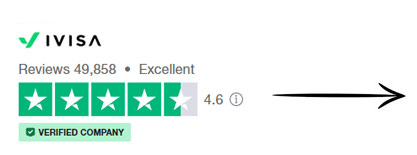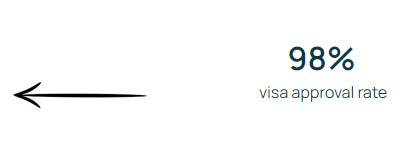Australia tourist visa for US citizens
US citizens wishing to visit Australia must obtain a visa before their departure. The quickest and easiest way is to apply for an eTA (Electronic Travel Authority), an electronic travel authorisation linked directly to the passport.
 Fast: Simplified, efficient process.
Fast: Simplified, efficient process.
 Security: information is protected.
Security: information is protected.
 Reliability: 98% approval rate.
Reliability: 98% approval rate.
 Assistance: 24/7 customer support.
Assistance: 24/7 customer support.


This eTA ‘visa’ is ideal for short-term tourist or business trips. Valid for 12 months, the eTA allows multiple entries into Australia with a maximum stay of 90 days per visit. Applications can be made online or via the official application, and processing is often instantaneous. However, it is advisable to apply a few days before travelling to avoid any unforeseen delays. The cost of the eTA for US citizens is AUD 20. This visa offers great flexibility for American travellers, while simplifying entry formalities. On this page, you'll find all the details you need to obtain your eTA for Australia, from the documents required to the processing times.
Do US citizens need an eTA visa for Australia?
- Visa requirement: US citizens need a visa to enter Australia, even for short stays.
- e-visa: the simplest option is to apply for an eTA (Electronic Travel Authority), an electronic visa available online. It is simpler and quicker to obtain than a traditional visa.
- Price: the cost of an eTA for US citizens is around AUD 20, plus any processing fees.
- How long does it take? Approval usually takes just a few minutes, but it is advisable to apply a few days before departure.
- Period of validity: the visa is valid for 12 months, with stays of up to 90 days per entry.


Applying for an Australian eTA for US citizens is a quick and easy process, designed to facilitate short-term travel to Australia. This electronic visa, intended for tourist or business stays, can be obtained entirely online, eliminating the need to visit an embassy or consulate. The procedure can be completed in just a few minutes via the official website, via the dedicated mobile application or via a service provider. Once approved, the eTA is linked directly to the traveller's passport, allowing paperless entry into Australia. Here are the steps to follow to apply for an eTA and the documents required.
To complete your eTA application, you will need the following documents:
The cost of the eTA for US citizens is approximately AUD 20, or about USD 14. Fees may vary slightly depending on the service provider, but this amount is one of the lowest for obtaining an eVisa.
In addition to these government fees, you will have to pay a processing fee which depends on the site if you choose a private provider with assistance.
The eTA processing time for US citizens is generally very fast. As a general rule, approval is obtained within minutes of submitting the application, but it is advisable to allow up to 24 hours to avoid any unforeseen circumstances. However, it is possible to obtain an eTA expressly, as the majority of applications are approved almost instantaneously, allowing travellers to receive their authorisation in a very short time. This rapid processing makes the eTA an ideal option for people needing a visa at the last minute.
However, it is advisable to apply at least a few days before the planned date of departure. In the event of errors in the information provided or if additional documents are required, delays may occur, but this is rare if the application is correctly completed from the outset.
The Australian eTA for US citizens offers considerable flexibility in terms of duration and validity. This electronic visa allows multiple entries for a period of 12 months from the date of approval. However, each stay in Australia may not exceed 90 consecutive days.
The eTA Australia visa allows US citizens to enter and leave the country several times during its one-year validity period. It is a multiple-entry visa, which means that you can travel to Australia as many times as you like as long as each stay does not exceed the 90-day limit.
With the eTA, US citizens can stay in Australia for up to 90 consecutive days per visit. If you wish to stay longer, you will need to leave the country and return or apply for a visa suitable for a longer period, such as a tourist visa (subclass 600).
The eTA Australia cannot be renewed once it has expired. If you wish to extend your stay or return to Australia after the one-year validity period, you will need to submit a new visa application. For longer stays or other reasons (study, work, etc.), it is necessary to apply for another type of visa before your eTA expires.
Although the majority of Australian eTA applications for US citizens are approved quickly, there are cases where an application may be refused. A visa may be refused for a number of reasons, usually relating to the information provided or the eligibility of the applicant. Here are the most common reasons for refusal and the steps to take in the event of rejection.
The most common reasons for refusal are as follows:
What should I do if my application is refused?
If your application is refused, you can submit a new application, correcting any errors. If the refusal is linked to a more complex situation (criminal record, health problems), you may have to provide additional documents or apply for another type of visa, such as a subclass 600 visitor visa. It is also advisable to contact the Australian immigration services to obtain details of the reasons for the refusal.
Australia is generally considered a safe country for travellers, including US citizens. The country offers a stable living environment with low crime rates and modern infrastructure, making it a popular destination for tourists and business travellers. However, as with any trip, US citizens are advised to take certain precautions to ensure their personal safety throughout their stay.
Australia's major cities, such as Sydney and Melbourne, are well equipped in terms of security, with visible and responsive police. Public transport is also safe, although isolated incidents can occur, particularly in less busy areas or late at night.
Australia is also subject to a number of natural hazards, including bushfires, cyclones and flooding in some areas. It is advisable to keep abreast of local weather conditions and natural hazard warnings during your trip.
Finally, for outdoor tourist activities such as swimming or hiking, extra precautions should be taken. Australian beaches, for example, are sometimes subject to dangerous currents known as ‘bayes’. It is therefore advisable to swim in areas supervised by lifeguards.
To sum up, Australia is a generally safe destination, but it is important for US citizens to follow local recommendations and take the usual precautions to travel safely.
Find out if your question has been answered in the list below
No, Australia does not offer a visa on arrival for US citizens. All travellers must obtain a visa prior to departure. The easiest and quickest visa to obtain is the eTA (Electronic Travel Authority), which can be applied for online prior to travel. Once approved, the eTA is electronically linked to the passport, allowing travellers to embark without the need for a paper visa. It is therefore essential to apply for this visa before you leave, as you will not be able to obtain it on arrival in Australia.
In addition to the eTA, a passport valid for the entire duration of your stay is required. You may also be asked to prove that you have sufficient funds to support yourself during your stay, as well as a return or onward ticket. These documents are not systematically required at border controls, but it is advisable to have them if requested by the authorities. Finally, although not compulsory, it is strongly recommended that you take out travel insurance to cover any medical expenses.
Yes, every American citizen, including children, must have a valid visa to enter Australia. Parents can apply for an eTA on behalf of their children online, providing accurate personal details for each child. The eTA is required for everyone, regardless of age.